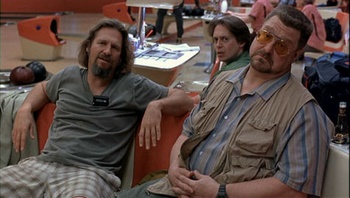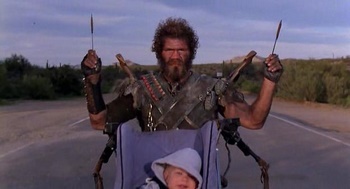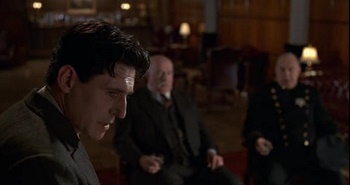 For whatever reason, I’ve steadfastly avoided most of the Coen brothers’ sillier movies. (If forced to ascribe a cause, I would point to The Hudsucker Proxy.) But a friend’s earnest e-mail (titled “Urgent Coen Brothers symbolism inquiry”) pushed me to watch Raising Arizona, which in the context of a discussion of nihilism and No Country for Old Men led me back to Miller’s Crossing, which for the hell of it got me (for the first time) to see The Big Lebowski. (Understand that I do not put Miller’s Crossing among “the Coen brothers’ sillier movies.”)
For whatever reason, I’ve steadfastly avoided most of the Coen brothers’ sillier movies. (If forced to ascribe a cause, I would point to The Hudsucker Proxy.) But a friend’s earnest e-mail (titled “Urgent Coen Brothers symbolism inquiry”) pushed me to watch Raising Arizona, which in the context of a discussion of nihilism and No Country for Old Men led me back to Miller’s Crossing, which for the hell of it got me (for the first time) to see The Big Lebowski. (Understand that I do not put Miller’s Crossing among “the Coen brothers’ sillier movies.”)
Watching the three together was instructive. First, it reinforced that the Coens’ filmography is amazingly consistent in its concerns. In all three, the protagonist is at the mercy of forces and figures far greater than himself, and he can scarcely imagine the depth and scope of the mess he’s in. (You can also see that formula at work in the brothers’ three most recent movies: No Country for Old Men, Burn After Reading, and A Serious Man.)
But I also realized that my resistance to the Coens’ absurdist films is not a fear of watching a bad movie; rather, it’s the certainty that my time investment won’t be rewarded beyond diversion.
Let me be clear: The brothers are expert entertainers, and amusement is a perfectly valid reason to watch a movie. But until recently – as the Coens have shown a new gift for resonance – their movies have been almost self-negating. By that I mean they announce, sometimes explicitly, that all you’ve just seen doesn’t matter a lick. (Marge Gunderson: “And for what? For a little bit of money.”) While it’s obviously cut from different cloth, this also holds true for Miller’s Crossing.
The Big Lebowski
 The best thing I can say about 1998’s The Big Lebowski is that I enjoyed it tremendously, even though I was prepared to hate it based on its cult-classic status. (I honestly and truly loathe The Rocky Horror Picture Show – both the movie and the group experience – but for the most part I avoid [admittedly for no good reason] those things that inspire people to ceaselessly quote from them.)
The best thing I can say about 1998’s The Big Lebowski is that I enjoyed it tremendously, even though I was prepared to hate it based on its cult-classic status. (I honestly and truly loathe The Rocky Horror Picture Show – both the movie and the group experience – but for the most part I avoid [admittedly for no good reason] those things that inspire people to ceaselessly quote from them.)
I love Lebowski’s outsize characters and the fully invested performances, and the obvious enthusiasm of the actors is infectious. (It’s great to see Julianne Moore having fun, and it’s great to see Steve Buscemi as the only remotely normal person in a movie.) And I appreciate that it’s all a tall tale amounting to nothing.
And yet … it’s all a tall tale amounting to nothing. Lebowski isn’t nihilistic in its message – there is, after all, a church devoted to the laid-back philosophy of Jeff Bridges’ character. But its essential triviality – the fact that nothing that happens in the movie is of any great import to its resolution – makes it a form of cinematic and narrative nihilism. That’s what I mean in arguing that the Coens’ movies are self-negating.
I know there are deep readings of Lebowski, and admittedly there are some curious contradictions in characterization: The Dude is at core more tightly wound than his militant best friend played by John Goodman. (Bridges’ character is fretful, easily agitated when things go wrong, and concerned about consequences. Goodman’s is violent and quick to anger, but he also lets things go more quickly and doesn’t worry about stuff such as his actions possibly leading to somebody’s death.)
Yet it’s difficult for me to abide by The Big Lebowski as anything beyond an intensely silly and disposable entertainment. It was gone the moment it was over.
Raising Arizona
 All of the above generalizations apply to Raising Arizona with one key exception: Leonard Smalls. The lethal biker bounty hunter elevates the Coens’ second movie through his mere existence.
All of the above generalizations apply to Raising Arizona with one key exception: Leonard Smalls. The lethal biker bounty hunter elevates the Coens’ second movie through his mere existence.
Smalls first appears in a dream of H.I. (Nicolas Cage) after the ex-con and his wife have kidnapped a baby because they can’t conceive or adopt one of their own. But while Smalls initially appears to be a symbol of H.I.’s unleashed guilt, it’s soon apparent that he exists in the real world, too, setting up a climactic showdown.
It’s a brilliant, ballsy move. The Coens make clear that Leonard is an aspect of H.I.: Beyond the matching tattoos, right after the plan to rob the bank is laid out, there’s a fade to Smalls’ motorcycle that makes it appear as if H.I. is breathing fire and has horns.
But it’s not nearly so tidy. This essential component of the narrative stands out for being incongruous even in the context of Raising Arizona’s thorough ridiculousness.
But it’s the preposterous nature of the movie as a whole that allows Leonard Smalls to exist both objectively (for example, visiting the store of the kidnapped kid’s father) and as a metaphoric demon chasing H.I.
Here the Coens’ farcical tone serves a purpose beyond itself: After the shootout following the convenience-store diaper holdup, the audience is prepared to believe just about anything.
Miller’s Crossing
 I have long assumed that 1990’s Miller’s Crossing would remain among my favorite Coen movies, as I love getting lost in it and looking at it.
I have long assumed that 1990’s Miller’s Crossing would remain among my favorite Coen movies, as I love getting lost in it and looking at it.
Yet after 2007’s No Country for Old Men and 2009’s A Serious Man, Miller’s Crossing feels newly empty. The Coens in recent years have developed an earnest existential and moral maturity that makes their period organized-crime thriller look threadbare.
In Miller’s Crossing, the Coens are nearly giddy in setting up and executing crosses, double-crosses, and maybe even triple-crosses, with the inscrutable Tom (Gabriel Byrne) as the punching bag in the middle. The movie’s endgame is that for all the work the Coens make the viewer do just to keep up with the characters and greedy machinations, something simple drives the story: Tom’s unspoken loyalty to Leo (Albert Finney). It’s no accident that the film begins with a speech about ethics.
The problem – and this isn’t really a criticism, because I think the movie’s grasp matches its reach – is that its interest in morality is abstract rather than human. The story and reveal dictate the characters instead of the other way around.
At heart, there’s little going on in Miller’s Crossing beyond a narrative trick based on audience assumptions. The Coens want people to puzzle over what the hell Tom is after, and they succeed because they’re correct that few viewers will read into the protagonist anything but self-interest.
It’s a gorgeously made movie, and rock solid as an elliptical puzzle. But like most of the Coen canon, I found myself wanting more than the brothers were willing to give.


Tom as the punching bag in the middle? Tom is the primary actor in the drama, even if the Coens don’t betray his reasoning (true to Dashiell Hammett’s style, incidentally); he’s not merely carried along by events. He’s the instigator. He engineers double- and triple-cross to rescue his friend from himself (even as he is, admittedly, betraying his friend on the side), and at great personal risk, both physical and otherwise. It’s a movie about loyalty and integrity. I think it’s a much deeper movie than you do. Which is what I think lands it squarely in the Coen canon — the story has layers, and there are several ways to watch it. But mere diversion? Like all good storytelling, there’s more to it.
Grump.
Grumpy TF: Tom is certainly the primary actor, and he’s ultimately revealed as the instigator. It is a movie about loyalty and integrity. So we can agree on those points.
He’s also the punching bag in the middle. You don’t really dispute that, do you? How many times does he get beaten?
I think the clever trick of the movie is that Tom appears to be asea throughout, even though he’s clearly not. But I don’t yet see much more to it than that.
I don’t think Miller’s Crossing has the richness of No Country or A Serious Man – which stand far above every other Coen movie. I’d put Miller’s Crossing at the top of their second tier, probably just above Fargo.
I’ll let you know if Hammett’s The Glass Key changes my mind about Miller’s Crossing.
I found “Miller’s Crossing” to be among the better gangster films released during a glut of them in the fall of 1990. From that group, only “Goodfellas” matched up to this great Coen film.
I know it’s heretical, but I find it impossible to connect with Goodfellas. With that and my dismissal of Miller’s Crossing, I’m clearly a terrible person.
I agree with your point that “Miller’s Crossing” lacks depth, but is still a fun enough ride to put it high up in the Coens’ canon. My coupling it with “Goodfellas” was meant to note that the directors from both movies understood that to entertain the audience in the gangster genre was enough. “The Godfather III,” released at the same time, failed in the grasp-reach thing.
I’d like to see Goodfellas again in the context of current political events. If I remember correctly, a clutch of relatively personable bullies & thieves unwittingly creates a monster, a dimwitted member of their crowd who takes the gangster philosophy (?) too far, to its extreme margin. They’re horrified by him, but he’s one of them. What to do?
I came on the site today because I recently saw The Good Shepherd & wondered what you thought of it. Don’t see anything, so maybe that’s my answer.
I find it interesting how different our interpretations of Miller’s Crossing are. Not only is this my favorite of the Coen’s movies, but it’s my favorite movie. I think that the issues of loyalty and ethics are certainly the crux of the movie, but far from flat. In the first place, I haven’t found any loyal or ethical characters in the movie, least of all Tom. Don’t forget that the initial conflict revolves around his affair with the girlfriend of the man he is supposed to be so loyal to. He goes on to play his position just to barely stay above water and survive, or maybe to bring his old pal Leo back to power. We never get to know. Near the end he plainly states that he doesn’t know why he does everything he does. He almost loses too -for Leo, for himself, and for the welfare of the city. None of the other characters are a prize either. Leo beats his best friend to a pulp. Verna cheats on Leo. Let us not even discuss the possibility of ethics in Bernie. Mink Cheats on Dane with Bernie. Caspar kills his right hand man, the Dane, not to mention starting off this conflict with his expectations of a fix. The Mayor and Police Chief are bumbling sycophants who would allow the fate of the city to fall in the hands of the crime bosses. The closest character I can find to ethical is The Dane. He may be the most direct enemy of the protagonist, But he is the only character who stays loyal to his friends and does exactly what he says he’s going to do until the last moment of his life. What do you know? The villain is the hero! If you want more insight to this movie, I would suggest reading not only “The Glass Key,” but also Hammet’s “Red Harvest,” and Ross Thomas’ “The Fools in Town are on Our Side.” The last two being, at the very least, among the most entertaining books I’ve read and I believe that they are both more influential on “Miller’s Crossing” than anyone gives them credit for. As for the movie of “The Glass Key,” Veronica Lake and Alan Ladd make a good looking couple on screen but not much more. I think that this movie is vast and layered in plot structure, but also in emotion, ethics, and theme. I’ve barely scratched the surface in this bit of blather. I would compare it to the Fugues quicker than to anything else. And yes, I think you’re a bad person.
Since having read your post with the glowing reception, I’ve been watching “A Serious Man.” I am only halfway through it. I don’t think that I can make it. I vehemently disagree with anything positive that anyone on earth might have to say about this movie. It is worse than “Dusk til Dawn.” It is worse than “Shrek” or any of its sequels, I can’t differentiate between them. It is worse than Scientology. It is worse than Nazi Germany, former Yugoslavia and Czechoslovakia, and Rwanda all rolled into one. This movie might be a sign of the coming end to humanity. And yes, you are a bad person. Not really. Well, maybe.
rhkingpin: I’m undoubtedly a bad person, but if you think Miller’s Crossing is great and A Serious Man is shit, there’s very little for us to discuss.
I’ve been very much enjoying your reviews (magnolia and this one, so far).
I would like to share my 2 cents on miller’s crossing and the big lebowski (please excuse my second language 03:34 english).
miller’s crossing –
beyond loyalty and ethics, the film fiddles with the question whether business and emotional relationships can go together. This has a lot to do with the hat motif, which I don’t remember all of its appearances.
Tom’s approach is that it cannot.
Consider the relationship between leo and tom. Tom is loyal to leo, but from a certain moment – “I said I don’t want anything to do with him, not that I don’t care about him”. What certain moment was that? When leo decides to sacrifice business interests for his love for verna.
At the end of the movie, after tom finished saving leo’s ass, he doesn’t want to work with him anymore – the final shot shows him looking at leo under his hat.
Now consider the relationship between verna and tom. What Verna does is to use sincere emotional relationship to promote her interests. (she even feels guilt for it – “We are a couple of heels Tom.”) She represent what Tom lacks in his life, which is why he’s attracted to her (it begins when she steals – no, earn – his hat). However, he will not admit he loves her and claims it’s all business (“I want you to stop using leo” and so forth).
His decision to not kill Bernie was paralleled to leo’s – relationships over interests. When Bernie betrays him (and Bernie is, as you know, magnificently unethical, using unsincere relationships (after being constantly mocked)), he is now proven right and return to his old ways. (nicely done is how when he runs through the window with a gun to get bernie he doesn’t forget to put his hat back on).
The big lebowski is a wonderful film, full with endless creative and artistic ideas as well as original and inventive (and artistic) themes. It is my personal favorite so far, and I highly recommend that you watch it again. for me it got better each one of the seven additional viewings i had of it.